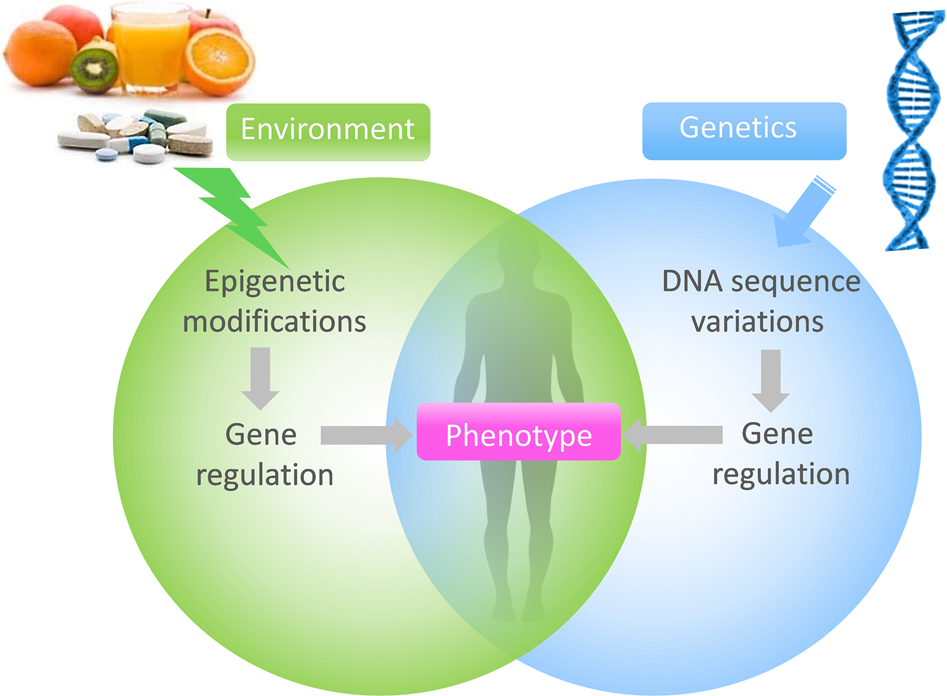It’s Not a Life Sentence

Though I love finding a great pair of well-fitting jeans, these days I am more interested in making sure my genes are working well! A gene is the basic physical and functional unit of heredity, made up of coding strands called DNA. At birth, we receive 2 sets of genes, one from each parent, and what information shows up is known as gene expression. For example, I have brown eyes and my husband has brown eyes, all be it a lighter shade. My eldest child turned out to have blue-green eyes. This indicates that both my husband and I passed on the genetic coding for light eyes to my child. In other words, genes give your body the information to make you who you are, brown curly hair, brown eyes 5 feet 2 inches tall. Much of the information in our is going to show up as it is coded and can not be altered by the environment unless of course you get colored contacts or dye your hair. However, the recent study of epigenetics shows that some genes that are inherited can stay quiet until they are turned on. Environmental influences, such as a person’s diet and exposure to pollutants, can impact the epigenome by altering the way molecules bind to DNA or changing the structure of proteins that DNA wraps around. These structural changes can result in changes in gene activity; they also can produce more dramatic changes by switching genes on when they should be off or vice versa. This turning on of genes can result in illness that can be prevented. You may have a familial trend toward diabetes, however, changes in your diet and lifestyle can turn on or keep that gene from expressing itself. Let’s look at Thre things that can positively affect your genes for health and longevity.
- It always starts with diet. The food we ingest is information to our cells all the way down to those tiny molecular DNA molecules. Epigenetic impacts are not limited to obesity and diabetes but a Study at the University of Cambridge showed that undernourished pregnant mice had offspring with glucose intolerance and pancreatic issues. There are indications that there can be an epigenetic basis for many diseases including depression and alzheimers. It’s not only what you eat today but, recent studies suggest that what you eat affects you and sometimes even your children and grandchildren. Making sure that the foods you are choosing are free of chemicals and unprocessed is going to go a long way to protecting your genes and your health. Did you know that there are many food additives that are allowed in the United States that are BANNED in other counties? Learn to read labels and stay away from things you can not pronounce or better yet are not found in nature!
- I am constantly preaching the avoidance of environmental toxins. The chemicals in our everyday self-care products, cleaning products, pesticides, and plastic just to name a few can not only cause hormonal changes but can also affect our body on a cellular level. BPA for example has been extensively studied and shown cause gene alterations leading to cancer, and affecting the reproductive system, metabolism, pubertal development, peripheral arterial disease, infant and childhood growth, and neurodevelopment outcomes. Is it any wonder why I stick to glass storage containers whenever possible? Once again reading labels sticking with products that use the power of nature to clean and enhance your natural beauty. Here once again many chemicals are banned overseas that easily find their way into the products in the United States.
- Stress is another factor that can affect our gene expression and response. In today’s world, we are constantly bombarded with stressful messages from Social media and the news. Stress reduction is immediately realized at the cellular level. If you find yourself in a stressful situation, get out of it as quickly as possible. Walk away to a quiet place, and find your calm. In recent years there has been a lot written about meditation. What is very exciting is that no science can clearly demonstrate that meditation can change your brain and your genes. The study of how meditation affects our genes gets into changes in brain structure and alteration in a portion of the DNA known as telomeres. The science here gets much deeper than I am ready to get into, so let’s just leave it with the statement that science has shown that meditation can protect your DNA from adverse epigenetic changes.
Though we can not control all that we are exposed to that can adversely affect our health, lifestyle changes can go a long way to offering some protection. If you are ready to learn more about ways that you can support your health naturally reach out I am here to offer guidance.
